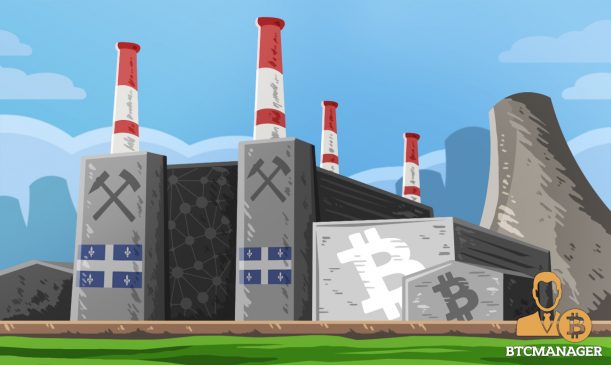The technical infrastructure of the Canadian province has been in place since the turn of the century. And much like several states from its border partner just South, many of these relics of the industry are going to waste. Electricity plants, coal mines, and the like are thus being reimagined as large scale cryptocurrency mining facilities.
Canada’s Regulatory Stance
The cold temperatures, low electricity prices, and a massive surplus of energy have turned Canada into a magnet for crypto mining operations. Québec, an eastern province just North of Maine and Vermont, has been at the forefront of this movement. As reported in January 2018, swaths of Chinese miners began moving into the region pending imminent clampdown on mining operations in the Asian country.
Hydro-Québec, Canada’s largest utility provider, responded by saying that the influx of crypto business had forced them to reorganize their financial strategy to meet demand.
Local mining operations were eventually halted as concerns that citizens would end up facing higher energy fees to compensate for their energy-intensive neighbors. Fortunately, the pause was ultimately lifted, and in April 2019 the local energy regulator, Régie de l’énergie allocated an additional 300 MW of electricity to support such mining ventures.
One such company that has capitalized on this change of heart has been Bitfarms. Founded in 2017, near the peak of crypto mania, the company has managed not just to survive regulatory uncertainty but expanded its operations to become one of the largest mining operations in North America. “Since we began, we have been mining mostly bitcoin, but also some litecoin, dash, and ether,” said Wes Fulford, the company’s CEO, in an interview with BTCManager.
Outside of managing five mining sites in Québec, Bitfarms also played an active role in preventing the state’s proposed hike on energy prices earlier this month. Before finally allocating more energy resources, Régie de l’énergie wanted to implement a price bidding mechanism for which interested companies could purchase additional energy sources. This was eventually disbanded in place of merely allocating additional blocks of energy.
Following the announcement, Fulford explained that the security that comes with abandoning the free market model would allow Bitfarms to continue expanding throughout the region.
Green Power and Upcycling Infrastructure
The larger narrative at stake here is that of energy consumption for securing a specific blockchain. One of the first critics of mining requirements, Digiconomist, sparked numerous articles that the equivalent amount of electricity needed for Bitcoin could power entire countries.
(Source: Digiconomist)
Fortunately, much of this energy in Québec comes from hydro and other green sources of energy.
A report from the National Energy Board (NEB), another national energy regulator, indicated that 99.8 percent of Quebec’s electricity comes from renewable resources. The majority of this energy comes from hydropower, with wind and biomass a close second and third. The slow shift from oil and diesel sources has also been advantageous for Fulford and his team who explained that their operations are running almost entirely on renewable sources. The Bitfarms CEO said:
“The biggest problem with any mining operation is determining how to reduce the power expense. We ask questions like, ‘how much will power cost,’ ‘how are we using that power best,’ and then we make sure that we design our sites as efficiently as possible.”
And if not for the power sources, Bitfarms is also taking advantage of the remnants of a crude fuel and legacy mining infrastructure. Historically, Québec has been a hub for traditional mining of gold, tellurium, titanium, and columbium since the 1990s. “This has been hugely advantageous for us,” said Fulford. “The energy infrastructure is already in place making crypto mining far less cumbersome to introduce.”
Bitfarms has thus been profiting, along with a few other players, from relatively favorable regulations, vast renewable resources, and a sophisticated energy network. And with all of these pieces in place, the company’s pipeline expects an additional five operations throughout the region.
Keeping a close eye on how Québec is treating its crypto mining industry also provides a template for the rest of the digital economy.
Like BTCMANAGER? Send us a tip!
Our Bitcoin Address: 3AbQrAyRsdM5NX5BQh8qWYePEpGjCYLCy4




